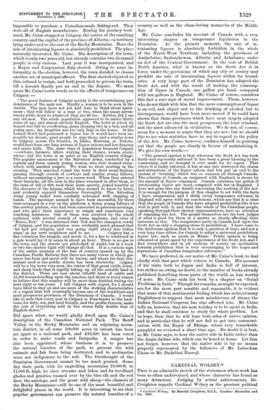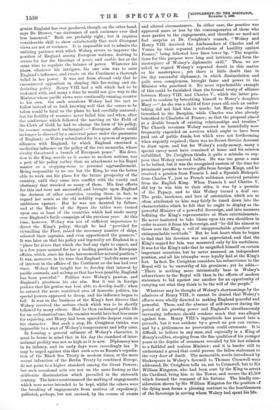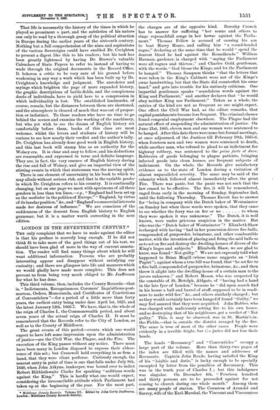CARDINAL WOLSE Y.* THIS is an admirable sketch of the
statesman whose work has been so often undervalued, and whose character has found so many detractors. Judging by actual achievements, Dr. Creighton regards Cardinal Wolsey as the greatest political
• Cardinal Wolsey. By Mandell Creighton, D.C.L. London : Macmillan and Co, 1888.
he entered the more restricted area of domestic politics, his Whatever may be thought of Wolsey's shortcomings by the special powers appeared to droop, and his influence began to admirers of Henry VIII., it cannot be denied that Wolsey's fail. It was on the business of the King's first divorce that efforts were wholly directed to making England peaceful and Wolsey received the serious check which was to be shortly powerful. These, and the absence of self-interest during the followed by many others. Had be then exchanged public life period of his growing power and England's simultaneously for an ecclesiastical one, his enemies would have had less cause increasing influence, should condone much that was alleged for rejoicing, and Henry had been spared the deepest stain on against him. Henry VIII.'s ingratitude has passed into a his character. But such a step, Dr. Creighton thinks, was proverb; but it was outdone by a greed no pen can excuse, impossible to a man of Wolsey's temperament and lofty aims. and by a pitilessness no provocation could extenuate. It is
In forming a general estimate of Wolsey's character, it difficult to believe in any man, and especially in a King of must be borne in mind that in his day the standard of inter- Henry's calibre, stooping from the fine qualities of his younger national probity was not so high as it is now. Diplomacy was years to the depths of meanness revealed by his last mission in its infancy, and its early days were exceedingly lax. It to a faithful and zealous Minister; and it is harder still to may be urged against this that such acts as Russia's repudia- understand a greed that could pursue the fallen statesman to tion of the Black Sea Treaty in modern times, or the more the very door of death. The memorable words introduced by recent infraction of the Berlin Treaty by combined Europe, Shakespeare in Wolsey's farewell to Thomas Cromwell were do not point to a higher standard among the Great Powers ; addressed, Dr. Creighton tells us, not to Cromwell, but to Sir but such occasional acts are not on the same footing as the William Kingston, who had been sent by the King to arrest deliberate dissimulation which prevailed in the sixteenth the Cardinal, bring him to the Tower, and secure the £1,500 century. The latter countenanced the making of engagements which formed the remnant of his fortune. The kindly con- which were never intended to be kept, whilst the others were sideration shown by Sir William Kingston for the position of the breaking of engagements from motives of expediency, the dying man forms a pleasing contrast to the heartlessness palliated, perhaps, but not excused, by the course of events of the Sovereign in serving whom Wolsey had spent his life. genius England has ever produced, though, on the other hand, and altered circumstances. In either case, the practice was says Dr. Brewer, "no statesman of such eminence ever died approved more or less by the contemporaries of those who less lamented." Both are probably right ; but it requires were parties to the engagements, and therefore we need not considerable skill to show satisfactorily that such divergent feel surprise at Dr. Creighton's remark, " Wolsey and views are not at variance. It is impossible not to admire the Hem), VIII. deceived the Ambassadors of Charles and of untiring patience with which Wolsey strove to improve the Venice by their repeated professions of hostility against position of England among European nations, desiring to France," being followed four lines lower by, " The negotia- secure for her the blessings of peace, and enable her at the tions for this purpose were long and intricate, and form the same time to regulate the balance of power. Whatever his masterpiece of Wolsey's diplomatic skill." Thus, we are plans, whatever his intrigues, his one aim was to raise asked to regard Wolsey's repeated deceit in this matter England's influence, and create on the Continent a thorough as his masterpiece ; yet there is little doubt that in belief in her power. It was not from abroad only that he his day successful diplomacy, in which dissimulation and encountered opposition in shaping this far-seeing and un- guile were conspicuous, brought fame and power to the deviating policy. Henry VIII. had a will which had to be Minister who practised it. No more reprehensible example reckoned with, and many a time he would not give way to the of this could be furnished than the formal treaty of alliance Minister whose pacific views were continually running counter between Henry VIII. and Charles V., which the latter pro- to his own. On such occasions Wolsey had the tact to posed to confirm by betrothing himself to Henry's daughter follow instead of to lead, knowing well that the course to be Mary :—" As she was a child of four years old, such an under- taken would be fatal to the plans he had carefully matured; taking did not bind him to much; but Mary was already but his fertility of resource never failed him, and when, after betrothed to the Dauphin, while Charles was also already the conference which followed the meeting on the Field of betrothed to Charlotte of France ; so that the proposal aimed the Cloth of Gold, he had to change the form of his policy, at a double breach of existing relationships and treaties." its essence remained unchanged :—" European affairs could The Church revenues Wolsey received so bountifully were no longer be directed by a universal peace under the guarantee frequently expended on services which ought to have been of England ; so Wolsey substituted for it a system of separate Paid out of public funds, but which were not forthcoming alliances with England, by which England exercised a when urgently required ; there was no Secret Service Account mediating influence on the policy of the two monarchs, whose to draw upon, and but for Wolsey's ready-money, many a rivalry threatened a breach of European peace." His devo- special envoy must have remained at home and his mission tion to the King, servile as it seems to modern notions, was unfulfilled. Dr. Creighton thinks it quite a mistake to sup- a part of his policy rather than an attachment to his Royal Pose that Wolsey received bribes. He was too great a man master or a stepping-stone to personal aggrandisement. to be bribed, but it was the recognised custom of the time for Being responsible to no one but the King, he was the better prominent persons to receive gifts from foreign Kings, and he able to work out his plans for the future prosperity of the received a pension from Francis I. and a Spanish Bishopric country, until they came into conflict with the vanity and from Charles V., just as French noblemen received pensions obstinacy that wrecked so many of them. His first efforts from the English King. When Francis I. and Charles V. for this end were not successful, and brought upon England did try to win him to their sides, it was by a promise the derision of other countries, causing them, in fact, to of the Papacy, and to this Wolsey turned a deaf ear. regard her much as the old nobility regarded him,—as an The pride, insolence, and love of ostentation which are so ambitious upstart. But he was not daunted by failure, often attributed to him may fairly be toned down into the and at the Battle of the Spurs the tables were turned characteristics which he felt that he ought to display as the upon one at least of the countries which had made merry powerful Minister of a powerful Sovereign, and into manners over England's futile campaign of the previous year. At this befitting the King's representative at State entertainments. time, however, Wolsey was not of sufficient importance to He never hesitated to take blame upon his own shoulders in direct the King's policy, thoagh he had " provided for order to avert it from his Sovereign, and " he did his utmost to victualling the Fleet, raised the necessary number of ships, throw over the King a veil of unapproachable grandeur and selected their captains, and even apportioned the gunners." unimpeachable rectitude." But he lost heart when he began It was later on that his policy and ingenuity set England in a to find that his devotion was not appreciated, and that the " place far above that which she had any right to expect, and King's regard for him was measured only by his usefulness. in a few years secured for her a leading position in European It was for the King's sake that he magnified himself on certain affairs, which, since his days, has seemed her natural position." important occasions, but he never assumed an independent It was, moreover, in his time that England " had the same sort Position, and all his triumphs were loyally laid at the King's of interest in the affairs of the Continent as she has had ever feet. In fact, Dr. Creighton considers his subservience to the since. Wolsey first taught her to develop that interest by Royal will to be unworthy of his greatness ; yet he adds,— pacific counsels, and so long as that has been possible, England " There is nothing more intrinsically base in Wolsey's has been powerful." Politics were Wolsey's passion, and subservience to the Royal will than in the efforts of modern England's greatness his one aim. But it was in foreign statesmen to bid against one another for an opportunity of politics that his genius was beat able to develop itself ; when carrying out what they think to be the will of the people."
That life is necessarily the history of the times in which he played so prominent a part, and the subtleties of his nature can only be read by a thorough grasp of the political situation in Europe during the earlier years of the sixteenth century. Nothing but a full comprehension of the aims and aspirations of the various Sovereigns could have enabled Dr. Creighton to present a digest like this to his readers ; but his task has been greatly lightened by having Dr. Brewer's valuable Calendars of State Papers to refer to, instead of having to wade through the original documents in the Record Office. It behoves a critic to be very sure of his ground before weakening in any way a work which has been built up by Dr. Creighton's knowledge and judgment. The anecdotes and sayings which brighten the page of more expanded history, the graphic descriptions of battle-fields, and the conspicuous deeds of individuals, have to yield here to a compression in which individuality is lost. The established landmarks, of course, remain, but the distances between them are shortened, and the atmosphere is cleared of much that was out of propor- tion or indistinct. To those readers who have no time to go behind the scenes and examine the working of the machinery, but who yet wish to see the drama of English history set comfortably before them, books of this class are most welcome, whilst the lovers and students of history will be curious to see how nearly their verdict and the author's tally. Dr. Creighton has already done good work in English history, and this last book will stamp him as an authority for the Wolsey era. It is clear and easy to follow, and his deductions are reasonable, and expressed in terse and definite language. They are, in fact, the very essence of English history during the rise and fall of Wolsey, and give an impartial view of the stirring events in which that statesman was the moving spirit.
There is one element of uncertainty in his book to which we may allude without serious risk, and that is the variable gender in which Dr. Creighton refers to his country. It is continually changing, but on one page we meet with specimens of all three genders in less than ten lines,—e.g., " England had been set up as the mediator in the politics of Europe," " England, by virtue of its insular position," &c., and " England's commercial interests made her desirous of influence." We are conscious of the suddenness of the descent from English history to English grammar, but it is a matter worth correcting in the next edition.




















































 Previous page
Previous page